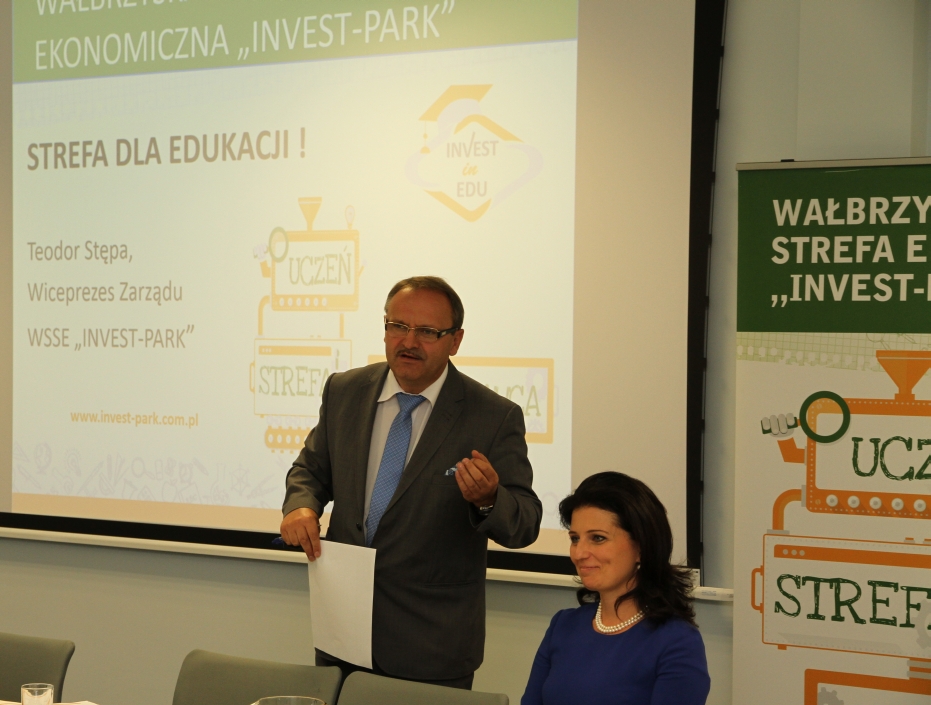At least 204 million zlotys will be spent on making the educational system better suited to meet the needs of the modern economy, e.g. by encouraging the cooperation between schools and entrepreneurs. The changes in the vocational education system initiated by the Ministry of Economy together with other ministries and Lower Silesian special economic zones were the main subject of a meeting with journalists at the Lower Silesian Innovation and Science Park.
Deputy Minister of Economy Ilona Antoniszyn-Klik emphasizes that it is the first time the Ministry of Economy has been so deeply involved in reforming the educational system.
“We have spent several years trying to come up with a system of education that would provide young people with good jobs that are in high demand in the labor market, jobs that are not only stable but also well-paid. On the other hand, it addresses the needs of entrepreneurs, in the zones and elsewhere, who need well-qualified employees who are familiar with the newest technologies and equipment and who would be willing to start work immediately. The schooling system must not be old-fashioned and limited to curricula that were developed in the past. The economy is changing dynamically, technology is leaping forward everywhere including Poland, and education must thus keep up with the newest trends – otherwise, schools will only educate the future jobless,” says Mrs. Antoniszyn-Klik.
Last year’s amendments to the act on special economic zones obliged the zones to actively support vocational education. The educational clusters that were set up in the Wałbrzych, Legnica, and Kamienna Góra special economic zones are intended to become platforms of cooperation for entrepreneurs, schools, special economic zones, self-governments, regional education authorities, labor offices, etc. Their task is to activate cooperation between partners, predict what skills and jobs will be needed in the labor market in the future, and make vocational education, including dual education, more easily accessible.
INVEST in EDU, the educational cluster established by the Wałbrzych Special Economic Zone, currently groups 76 entities. It can already boast significant achievements: company-sponsored classes, apprenticeships and internships, awards for the best students in given professions, scholarships granted by entrepreneurs, study tours, conferences and training sessions.
“Our entrepreneurs were eager to become actively involved in the Cluster’s activities. They are well aware that a good employee adds value to any company. Importantly, schools are also open to changes that will ensure high quality of education and either enable their graduates to quickly find good jobs or pursue further education at universities and colleges. What is even more significant is that the students themselves admit that choosing a vocational school will give them a chance to receive good education and find satisfying jobs. Many of these young people are very talented and hardworking, which is often emphasized by the entrepreneurs,” says Teodor Stępa, Deputy President of the Wałbrzych Special Economic Zone “INVEST-PARK”.
Educational clusters are also actively functioning in the other two special economic zones in Lower Silesia – the Legnica and Kamienna Góra SEZs.
“Some companies use machines that cannot be found anywhere else in Europe, and that is why the dual education system, i.e. combining theoretical learning at the school and practical training in companies, is the best and most efficient solution. Company-sponsored classes are ever more popular because this solution really works,” says Andrzej Niemiec, Deputy President of the Legnica Special Economic Zone.
Company-sponsored classes may also be created by the zones themselves. The Kamienna Góra Special Economic Zone for Medium Business supports the functioning of three newly-established classes that train the students to become renewable energy systems and equipment technicians (in Jelenia Góra), mechanical technicians, and cutting tool operators (both in Lubań).
Cooperation aimed at introducing changes in the vocational education system will be easier now because the Ministry of Economy is coordinating a special program financed with the amount of 200 million zlotys from European funds. Deputy Minister of Economy Ilona Antoniszyn-Klik is counting on effective cooperation between marshals of provinces, schools and companies.
“The action will be implemented as part of the Operational Programs. Additional funds will be at the disposal of the ministry. I would like to invite ambitious schools to take part in it – schools that would like to be innovative, creative, or simply useful. I would like school heads to inform special economic zones of their willingness to participate in the pilot program. Together, we would like to come up with the best model of vocational education that will provide students with practical skills and qualifications necessary to easily enter the job market. There is a lot of money available, let’s use it well,” encourages Mrs. Antoniszyn-Klik.















